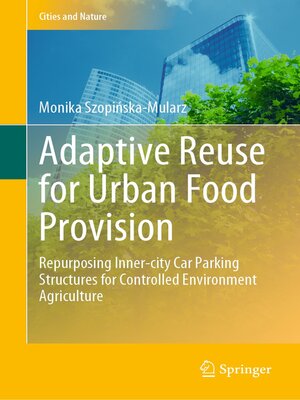Adaptive Reuse for Urban Food Provision
ebook ∣ Repurposing Inner-city Car Parking Structures for Controlled Environment Agriculture · Cities and Nature
By Monika Szopińska-Mularz

Sign up to save your library
With an OverDrive account, you can save your favorite libraries for at-a-glance information about availability. Find out more about OverDrive accounts.
Find this title in Libby, the library reading app by OverDrive.



Search for a digital library with this title
Title found at these libraries:
| Library Name | Distance |
|---|---|
| Loading... |
This book analyses the adaptive reuse potential of inner-city modern movement car parking structures for controlled environment agriculture systems and the contribution of such a transformation to urban development. Modern movement garages built over the last 60 years are becoming redundant due to changing mobility trends and growing environmental awareness. Adaptive reuse is one of the scenarios that can reconcile these megastructures with contemporary urban needs. The novel function proposed in this study for multi-storey garages is controlled environment agriculture, which is a food production technique that is now developing in cities as an innovative business and a secondary food source.
First, the study focuses on the theory of repurposing existing buildings for food production, which is then summarised in the form of a guide for the analysis of the adaptive reuse potential of inner-city car parking structures for controlled environment agriculture. Second, the guide is applied to two case studies, which allows exploring their potential to accommodate urban farming from planning, architectural, and environmental perspectives.The book aims to inspire and support decision-makers, architects, scholars and students when elaborating novel solutions for repurposing buildings for alternative functions. The publication encourages treating existing building stock as a resource that can become a stimulus for the new design process, which improves urban food provision.







